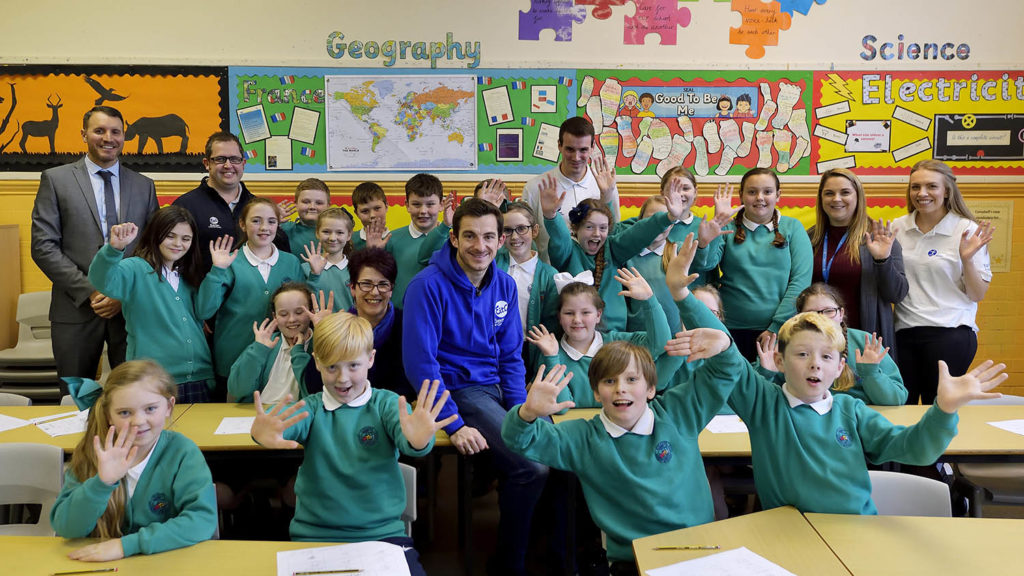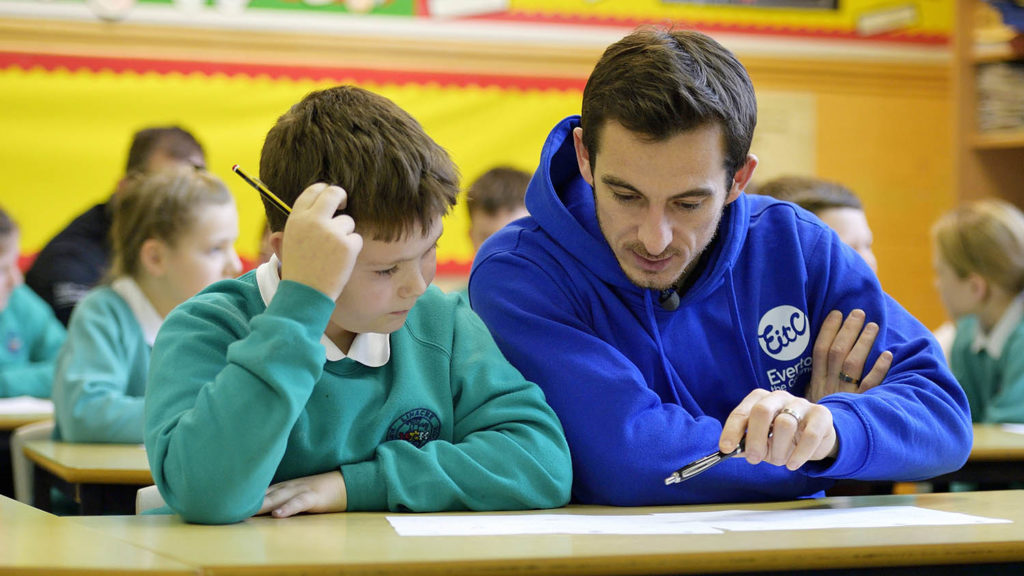The Research
Lead: Professor Andy Smith (Director of Centre for Mental Health, Sport and Physical Activity Research)
Research team: Rachel Wilcock (Research Assistant in Sport, Mental Health and Education) Aston Monro (Research Assistant in Sport, Mental Health and Education) Dr Helen O’Keeffe (Associate Dean, Students and External).
The Tackling the Blues research project is co-produced by the research team, programme management team (Everton in the Community and Tate Liverpool), partner school staff, children and young people, and student mentors.

Through qualitative, quantitative and creative methods, the research project aims to explore the impact of:
- The programme to the mental health literacy of children and young people and school staff.
- The use of sport and art-based approaches to deliver mental health related workshops.
- The programme to wider whole school approaches and mental health education.
- The engagement of student mentors and their employability and employment outcomes.
Impact and outputs
Tackling the Blues: a sport and education based mental health programme for children and young people
Smith, A., Wilcock, R., Monro, A., O’Keeffe, H. and Jones, J. (in press) Tackling the Blues: a sport and education based mental health programme for children and young people. In G. Breslin and G. Leavey (eds), Mental Health and Well-being Interventions in Sport: A Case Study Analysis, (2nd ed). London: Routledge.
This book chapter provides critical analysis of the design, delivery and evaluation of Tackling the Blues. Discussing;
- (i) The identification process of participants, and how they were recruited and engaged;
- (ii) Summarising the benefits and limitations of deploying a realist evaluation approach;
- (iii) Lessons learnt through using the brands of a professional football club and nationally recognised art gallery to engage CYP and the training of student mentors; and
- (iv) The impacts and inevitable limitations of the programme imposed through various inequalities which impact participants’ lives.
Developing young people’s mental health awareness through education and sport: Insight from the Tackling the Blues programme
Haycock, D., Jones, J., & Smith, A. (2020). Developing young people’s mental health awareness through education and sport: Insights from the Tackling the Blues programme. European Physical Education Review, 26, 644–681.
This article outlines the use of pupil-centred learning activities to explore pupils’ awareness of, and learning about, mental health as part of the Tackling the Blues programme. Findings reveal learning activities led CYP to focus upon the impact personal relationships with their family and friends, feelings and emotions, and experiences of stress, anger and entrapment can have on mental health. With argument made towards how embedding socially relevant learning activities within the content, organisation and deliver of school curricula may improve pupils’ sense of enjoyment, participation and achievement, all of which found to be important for increased enhancement and awareness of mental health and developing socio-emotional learning.
Impact Report 2016
The data reported in our impact report focuses on data from the children and young people participating in Tackling the Blues, which consists of:
- 30 focus groups completed with participants
- 123 participants interviewed as part of the focus groups
- Participants aged 6-14-years-old
“Like all of our work with Everton in the Community, Tackling the Blues is underpinned by rigorous scientific research which helps us to identify the programme’s impact on the lives of children and young people, and the benefits for their schools and other community groups.”
Professor Andy Smith, Edge Hill University
The key findings of the focus groups show how participating in Tackling the Blues has resulted in various benefits for children and young people and the organisations (schools and young carer groups) involved.
- All groups engaged in Tackling the Blues reported increases in self-confidence, self-esteem and reductions in anxiety
- The emotional literacy of children and young people improved and this helped them to better manage their mental health and relationships with others
- Tackling the Blues improved children and young people’s self-evaluation, co-operation and emotional intelligence
- Supportive relationships established between mentors and participants were key to maintaining engagement, supporting mental health learning and building trust
- Autonomy and decision making skills were developed by providing children and young people with choice and ownership of the activities delivered
Further Impact
Match of the Day – Leighton Baines
Tackling the Blues has featured on BBC’s Match of the Day on Sunday 26 February 2017, where Everton star Leighton Baines visited Linacre Primary School in Bootle to show his support for the programme. Baines participated in one of our classroom sessions and a game of our very own Emoji Bingo. You can watch our segment on the BBC’s website.

“Today I’ve been spending some time with these children and taken part in a game of ‘emoji bingo’. It’s been a really fun and enjoyable session but with a really important message. What is being done here is crucial – letting kids know that they can talk about things rather than bottling up emotions and normalising that helps to avoid potential problems further down the line.”
Leighton Baines, Everton FC
Read the full news story to find out more.
Health Select Committee Suicide Prevention Report 2016-17
Tackling the Blues, along with Active Blues, have both been recognised and praised in the Health Select Committee’s Suicide Prevention Report released on Thursday 16th March 2017. The Committee visited Goodison Park on Monday 14th November 2016, to find out what is being done in the Merseyside community to help tackle issues relating to suicide and mental health. Case studies from both Professor Andy Smith and Michael Salla, Director of Health at Everton in the Community, were presented to the Committee, demonstrating how the two projects have been contributing to the improvement and prevention of mental health illnesses. Professor Andy Smith told the Committee about the benefits of focusing on a whole school approach to mental health and wellbeing and developing a culture where mental health is a priority.
“It was an honour to be invited to speak to the Health Select Committee, as part of its national enquiry on suicide prevention, to discuss our collaborative sports-based mental health research with Everton in the Community. To have our partnership work recognised by the Committee as a model of good practice, and an example of how to practically implement aspects of the government’s national suicide prevention strategy, is especially pleasing. It is further testimony to our longstanding commitment towards adopting a collaborative, impact-focused, approach to research and community working which is of real benefit to the lives of others.”
Professor Andy Smith, Edge Hill University
